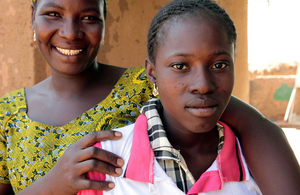African communities called on to end FGM in a generation
Voluntary and community African groups in the UK are being invited to bid for new grants to support their campaigns to end female genital mutilation in their countries of origin.

Picture: Jessica Lea/DFID
African communities in the UK will receive support to strengthen campaigns to end Female Genital Mutilation (FGM) through a new scheme backed by the Department for International Development (DFID) in collaboration with The Girl Generation, Development Minister Baroness Northover has announced.
Voluntary and community African groups in the UK are being invited to bid for new grants to support their campaigns to end FGM in their countries of origin.
Backed by The Girl Generation, grants of up to £9,000 will be awarded to up to 5 groups working in Kenya, Nigeria and The Gambia to:
- increase engagement between UK and African communities and organisations to strengthen support for the end FGM movement and grow participation
- build and strengthen relationships between organisations working on ending FGM on the African continent and the diaspora in the UK
- support and deliver campaigns in Africa by sharing experience of how to build support to end the practice
Find out more about the Girl Generation Diaspora Grants Programme:
The new grants come as DFID also launches a new 5-year research programme that will inform policy-makers and practitioners on how to design new ways to encourage communities in Africa to end FGM. Lead by the Population Council, the results of the research will help African communities to design efficient and cost effective ways to eliminate the practice.
Baroness Northover said:
Britain’s African communities are experienced and vocal campaigners against this cruel practice and have made great progress in ending it here in the UK.
The close links between communities in the UK and in Africa will help to build powerful grassroots movements that expose FGM for what it is: child abuse.
At the same time, the new research programme led by the Population Council will help support these initiatives by providing vital evidence about what actions we can take to make a real difference to the lives of women and girls.
The Diaspora Grants Programme is being operated by The Girl Generation, a consortium established by the Department for International Development (DFID) last year. The Girl Generation aims to galvanise the existing Africa-led, global movement to end FGM by supporting and accelerating campaigns against the practice in 10 of the most affected countries and mobilising the resources needed to end FGM in a generation.
The application process opens on Friday 6 February to coincide with Zero Tolerance to FGM day.
Naana Otoo-Oyortey, Executive Director, FORWARD, a consortium partner in The Girl Generation, said:
The Diaspora Grants will provide an opportunity for African-led organisations in the UK and organisations in the African continent to develop and strengthen their joint working to end FGM. This grant programme acknowledges the fact that diaspora organisations and individuals have been key players in raising the profile of FGM in the UK and many members of the diaspora are willing and able to contribute skills and expertise to support actions to end FGM in Africa.
Ian Askew, Population Council Director of Reproductive Health Services and Research said:
FGM is a human rights violation and a health risk to women and girls. This traditional practice must be eliminated.
Our evidence shows that when we understand why the practice continues, effective and appropriate interventions can be implemented that lead to change.
The Population Council and its consortium partners are pleased to join with DFID on this crucial research agenda. Working with national partners and communities, we can end FGM within a generation.
DFID is also marking Zero Tolerance to FGM day by announcing the new £8 million research programme led by the Population Council. This five year, multi-country research will build a global evidence base on the most efficient and cost-effective approaches to ending FGM, helping to inform future policy and programming.
The collaboration with The Girl Generation and the research programme form two key parts of the UK Government’s £35 million global programme to end FGM alongside support for the UNICEF-UNFPA Joint Programme supporting communities in Africa to abandon the practice.
Notes to editors
The Diaspora Grants programme is specifically intended to support efforts outside the UK. The Department for Communities and Local Government has awarded a number of small grants to support community-led efforts domestically.
The 2015 round of the grant will be open to applications on Friday 6 February 2015 and will close on Wednesday 8 April 12. The application form and guidance notes will be available on The Girl Generation’s website, www.thegirlgeneration.org from 6 February. Please email any enquiries to diaspora@thegirlgeneration.org
The Girl Generation was launched in October 2014. Phase one of their programme supports activity in Kenya, Nigeria and The Gambia. This will expand to a total of 10 countries.
The research programme is being led by the Population Council office based in Nairobi, working in partnership with the Africa Coordination Centre for Abandonment of Female Genital Mutilation/Cutting (ACCAF) at the University of Nairobi, the Gender and Reproductive Health & Rights Resource Centre (GRACE) at Ahfad University for Women (AUW), the Global Research and Advocacy Group (GRAG), the INDPEPTH Network, MannionDaniels Ltd. (MD), and Population Reference Bureau (PRB).
General media queries (24 hours)
Email mediateam@dfid.gov.uk
Telephone 020 7023 0600
If you have an urgent media query, please email the DFID Media Team on mediateam@dfid.gov.uk in the first instance and we will respond as soon as possible.